Best Cheap High-Calorie Foods for Weight Gain (+Bulking Tips)
Author:
Unlock your full potential by engaging with our experts and community! Have questions about your fitness journey or looking for expert advice on weightlifting techniques? Don’t hesitate — leave a comment below and David Sasha Schulz will provide a personalized answer and insights to help you reach your goals.
Torokhtiy is reader-supported. Some links are affiliate links, and we may earn a commission at no extra cost to you. See our disclosure page for details.
Bulking is a slow process. You have to navigate diet, training, and rest patiently. Many people have achieved their weight-gain dreams with determination, commitment, and a lot of money – or so it’s generally believed.
After research, we’ve selected some cheap high-calorie foods that will make you bulky, not broke!
Are there any cheap high-calorie foods? Several cheap calorie-dense foods can help you gain weight on a tight budget. Oats, peanut butter, canola oil, whole grains, and sunflower seeds are a few examples. What matters is that you go for healthy and sustainable items; the price tag is unimportant.
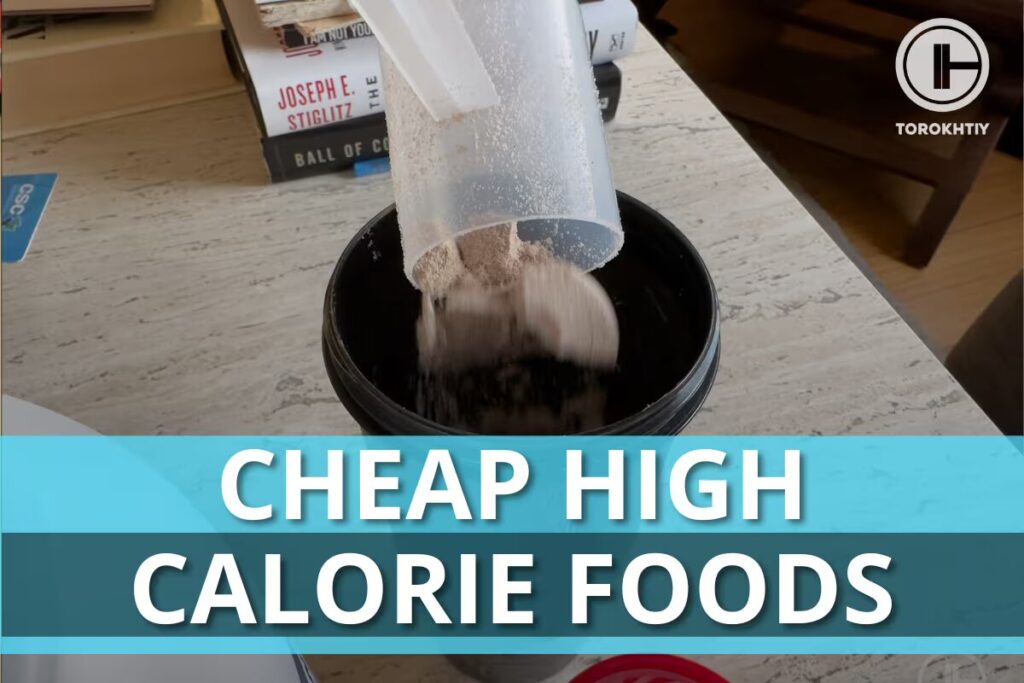
What Are Cheap, High-Calorie Foods?
Maintaining a calorie surplus is a surefire recipe to gain weight. However, you don’t need empty calories via loads of pizza, soda, or ice cream. You’ll end up abnormally increasing fat (not muscle) mass, which may threaten your cardiometabolic health even if total body weight is normal.
The way out is to gather those extra calories from nutrient-rich food. Such cheap calorie-dense foods are listed below, according to their content. Macronutrients (or macros) consist of carbohydrates, proteins, and fats.
These make up most of your diet’s dry weight and energy supply. Since you’re looking to gain weight, carbs will be responsible for about 40-60% of total calorie intake. Keep proteins high at 20-35% with fats below 25%. Be extra attentive to your fat intake, as its one gram packs 9 kcal as opposed to 4 kcal by the other two.
The Cheapest Sources of Carbohydrates
Carbohydrates can be found as sugar, fiber, and starch. They’re converted into glucose for energy production in the body. They can be simple or complex, whole or refined. While eating candy gives numerous calories, is it a wise choice? You should consume mostly complex carbohydrates with minimal added sugar. You can find some of the cheapest calories in the following high-carb foods.
1. Oats
- Calories per 100g: 381 (73.6% from carbs)
Oats rule high-carb items. Starch, fiber, and beta-glucan piece together its carbohydrate content. Research has shown cholesterol-lowering as well as glucose-regulating effects from oats.
It goes well in morning cereals, yogurt parfaits, and shakes. Furthermore, one buck can easily steal a pound of oats wholesale.
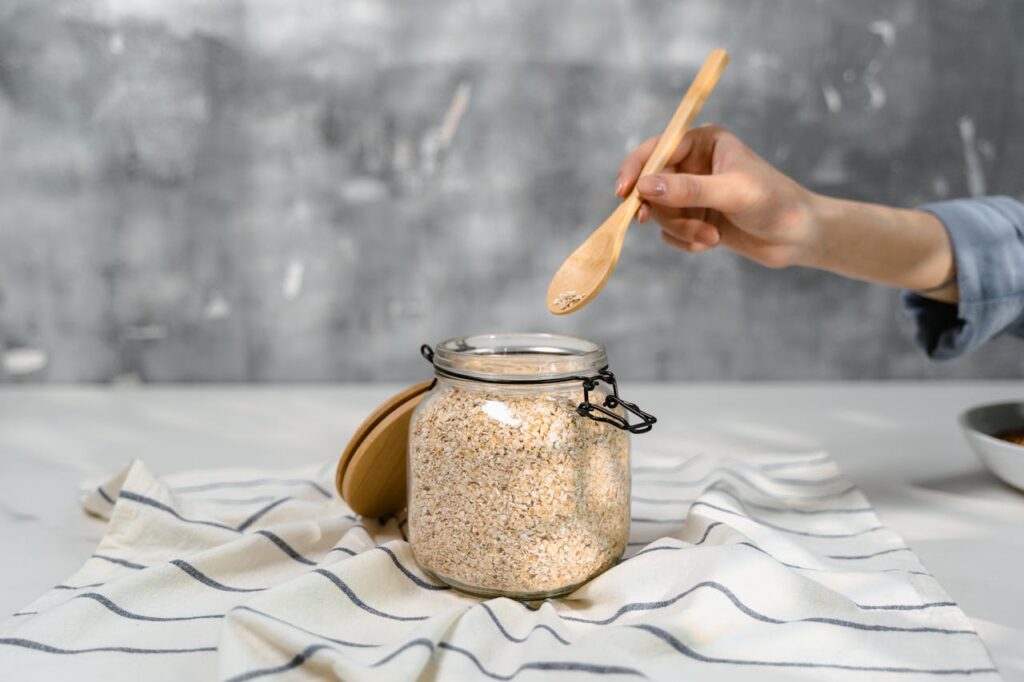
2. Pancake Mix
- Calories per 100g: 349 (84.6% from carbs)
Pancakes also sit among everyone’s favorite cheap weight gain meals. With a lower protein and fat profile, they’re jam-packed with carbs and calcium.It’s no surprise Hollywood hunks like the Rock eat a dozen of them while bulking. Watch out for sodium intake (~20% DV per 100g serving).
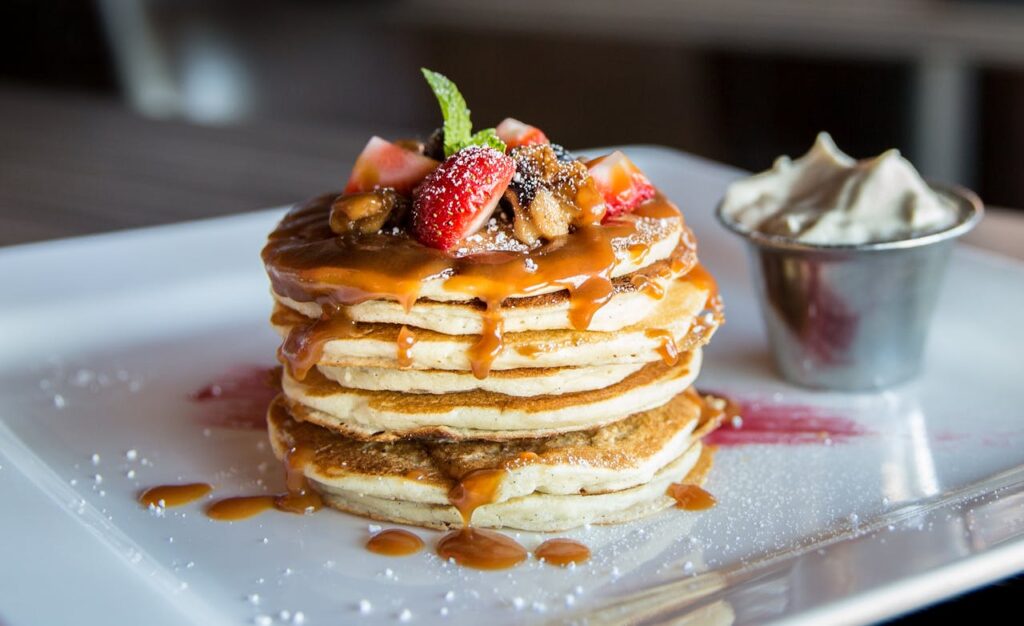
3. Whole-grain Bread
- Calories per 100g: 265 (65.3% from carbs)
- Gluten-free Alternative: White Rice
Whole grains have been a part of the human diet for thousands of years. Due to more minerals, they differ from refined grains, such as white rice.Although bread prices in the US have steadily risen, whole-grain breads are still among the cheapest high-calorie foods.
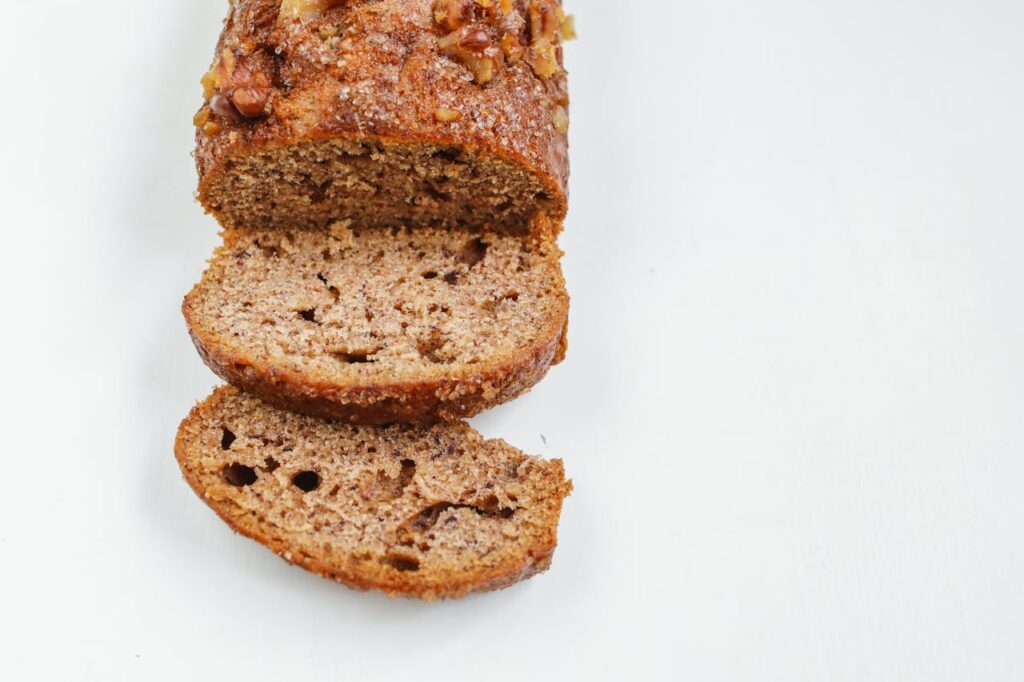
4. Sweet Potato
- Calories per 100g: 90 (92.0% from carbs)
The orange-fleshed, sweet-and-savory tuber is a staple food worldwide. Mash, steam, or bake! Put them in salad, curry, or a sandwich!Sweet potatoes contain all forms of carbohydrates. They’re also full of antioxidants that fight harmful free radicals in your cells.
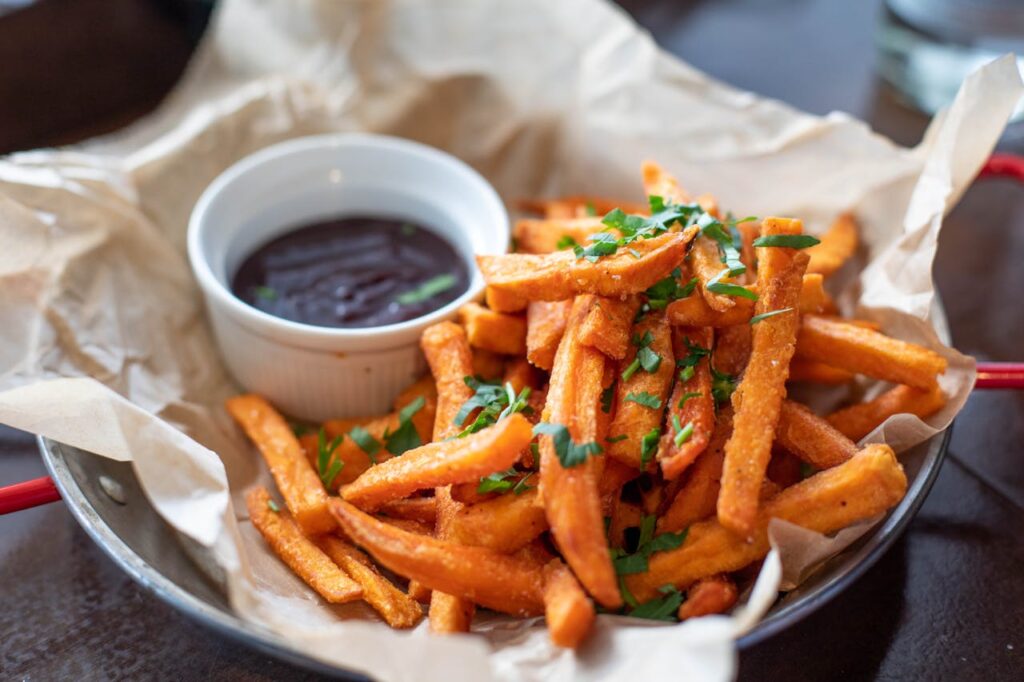
5. Banana
- Calories per 100g: 85 (94.5% from carbs)
The utility of bananas needs no introduction. One medium banana is 118g while a large one is 136g, adding about 30g of carbohydrates. Unripe bananas have more starch than sugar, which changes as they turn yellow and yummy.
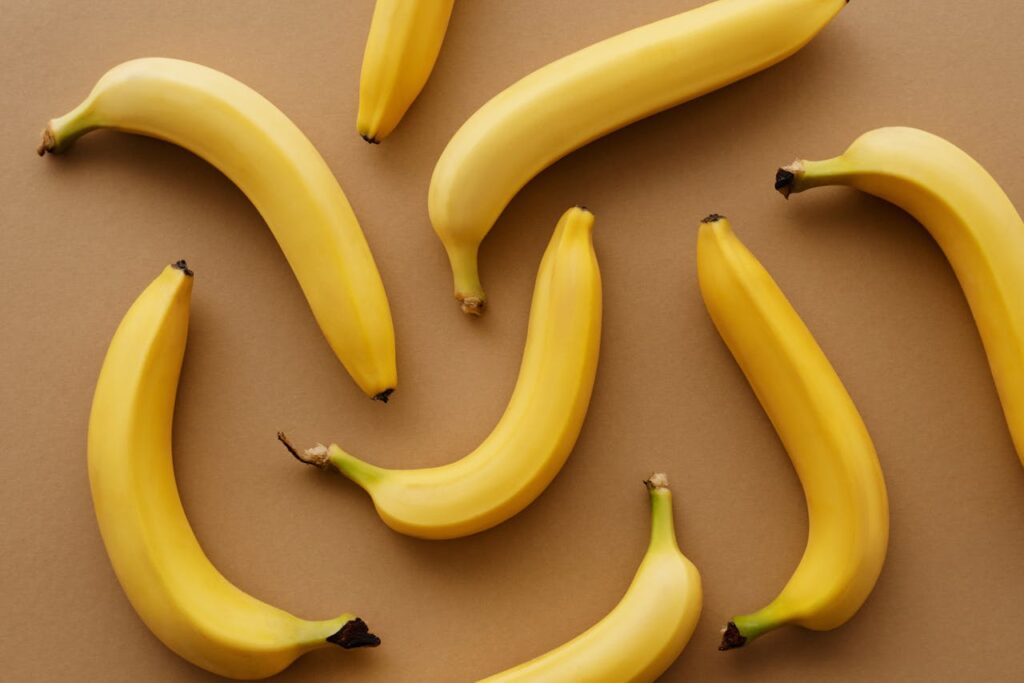
The Cheapest Sources of Protein
Protein serves various bodily functions. Its minimum recommended quantity is 0.8g/kg body weight. However, a higher range will promote faster muscle development. Protein is made of amino acids. There are 20 of them, out of which 9 are essential and must be taken from external sources. When looking for protein-rich cheap foods to gain weight, ensure they contain as many essential amino acids as possible.
1. Tuna (canned in oil)
- Calories per 100g: 198 (59% from protein)
Tuna has been a staple amongst bodybuilders and other athletes for decades. You get a great dose of protein (~30g per can) for a very low cost; potentially less than $1 per can depending where you live.If you get it canned in oil, you will increase the calorie content with healthy fats. The only downside is that tuna is notoriously high in mercury, so you should not consume it too frequently.
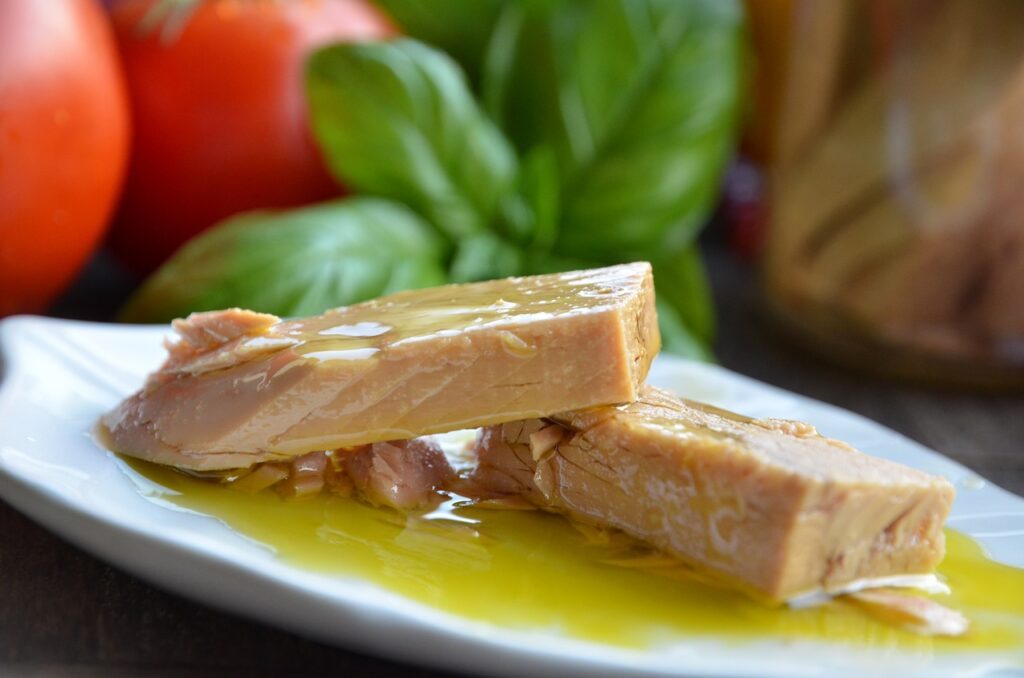
2. Whole Chicken
- Calories per 100g: 158 (81.3% from protein)
- Vegan Alternative: Tofu
Chicken is one of the most effective protein-rich sources for muscle and strength gains. The amount of calories and macros vary with cuts.For example, breasts have maximum proteins, whereas wings and drumsticks are fattier. The average whole chicken will set you back less than $2/lb.
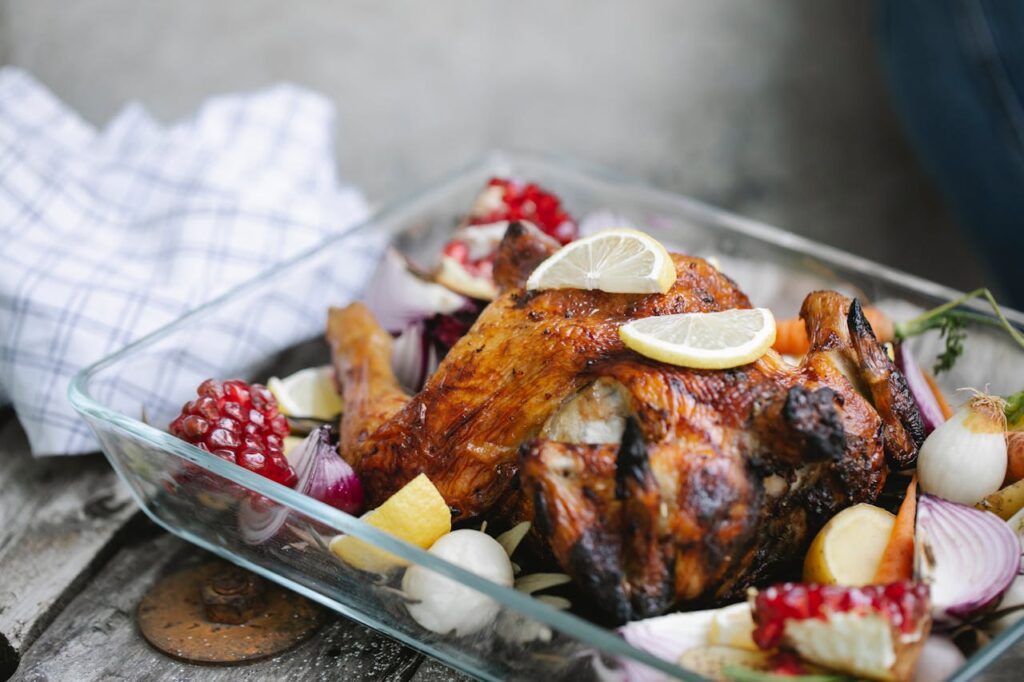
3. Eggs
- Calories per 100g: 143 (34.6% from protein)
- Vegan Alternative: Lentils
Whenever someone talks about nutrient-dense foods, eggs are sure to come up. Eat only whites to keep fats in check, although whole eggs can positively overhaul your metabolic and cardiovascular parameters. Regardless, watch out for your appetite and calorie intake.
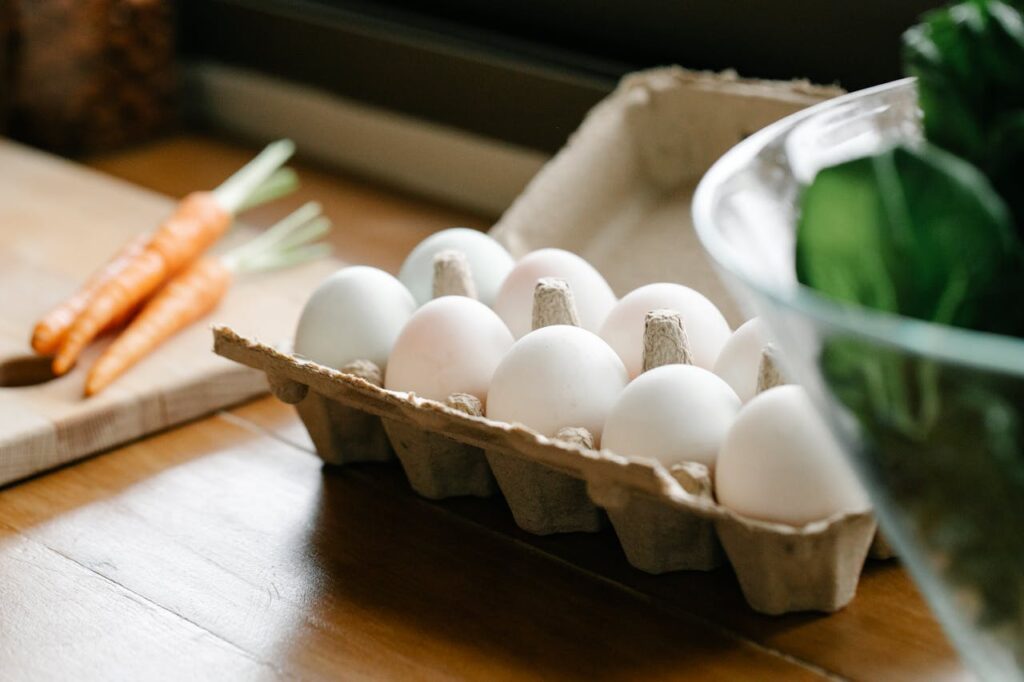
4. Greek Yogurt
- Calories per 100g: 94 (37.4% from protein)
From eating plain to whipped, yogurt is a versatile and inexpensive food item. Greek yogurt has more protein and less sugar than regular yogurt.It’s made by straining out excessive whey, giving a thicker and creamier texture. Look for a “live and active culture seal” to up the wellness benefits.
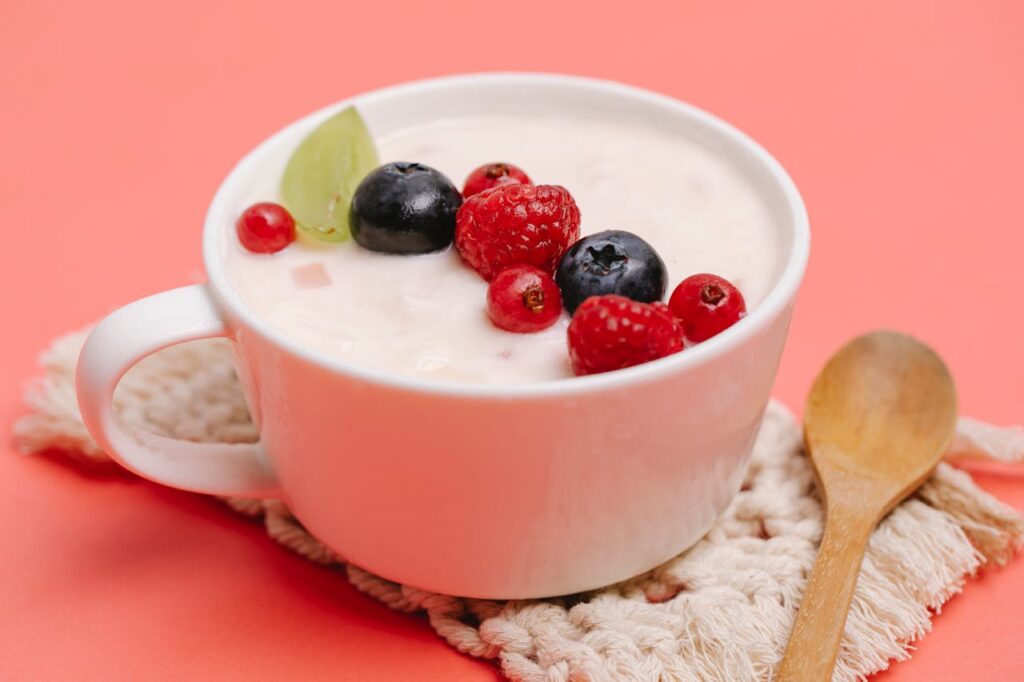
The Cheapest Sources of Fats
Fats (lipids) have got a bad rap. They’re critical for many structural and functional roles. Some wonderful fatty acids, like the omega-3’s EPA and DHA, can’t be produced by the body. You should, however, limit the intake of saturated fat.
substituting it with good fats and carbs to ward off heart disease risks. Whether you eat costliest or cheapest calorie-dense foods, they will have a mix of saturated and unsaturated fat. Look to maximize the latter.
1. Peanut Butter
- Calories per 100g: 632 (15.3% from protein)
Peanut butter is always a top choice for spreads and smoothies. It’s a high-protein, high-fat option. Even the most popular brands charge $3 max for a one-pound (16 oz) pack. Look for ‘natural’ tags to avoid added sugars and flavors when shopping.
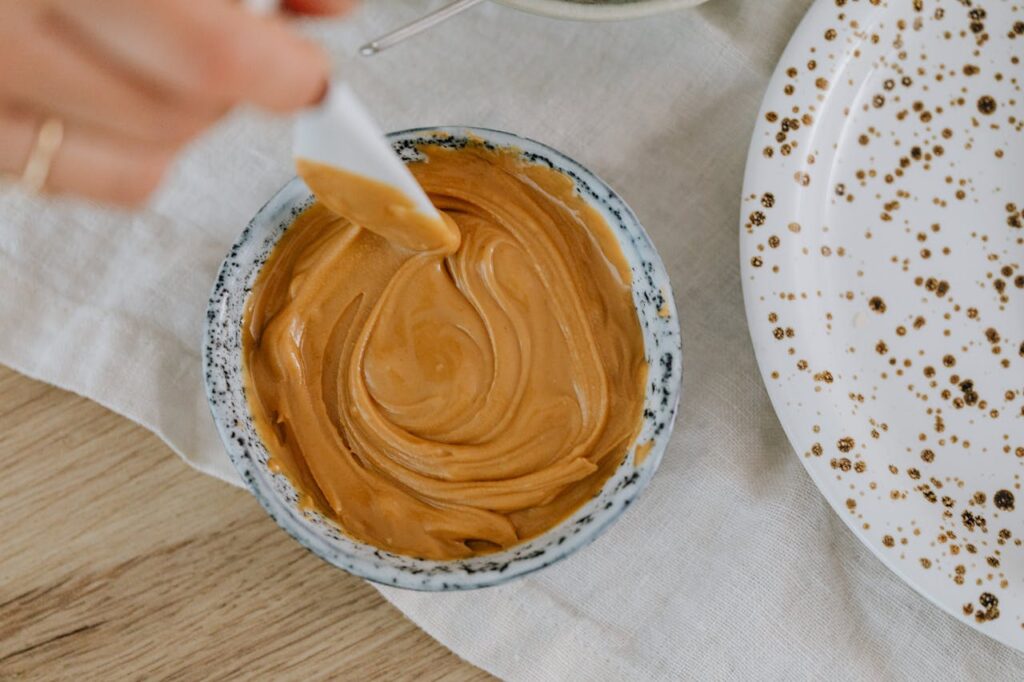
2. Canola Oil
- Calories per 100g: 884 (96.2% from fat)
Canola oil should top the list of cheap high-calorie meals for bulking. It’s highly affordable, supplying 2000 calories in less than half a dollar. It’s not generous with nutrients, though, showing some traces of Vitamin E. The lipid distribution is incredible, with over 90% healthy plant fats.

3. Sunflower Seeds
- Calories per 100g: 584 (29.3% from protein)
Known to carry a distinct crunchy and nutty flavor, sunflower seeds are being explored for health benefits. They help with anti-inflammation, immunity, and energy boost. You can have them raw or roasted. Spit out the black shell. However, the best use is as sprinkles.
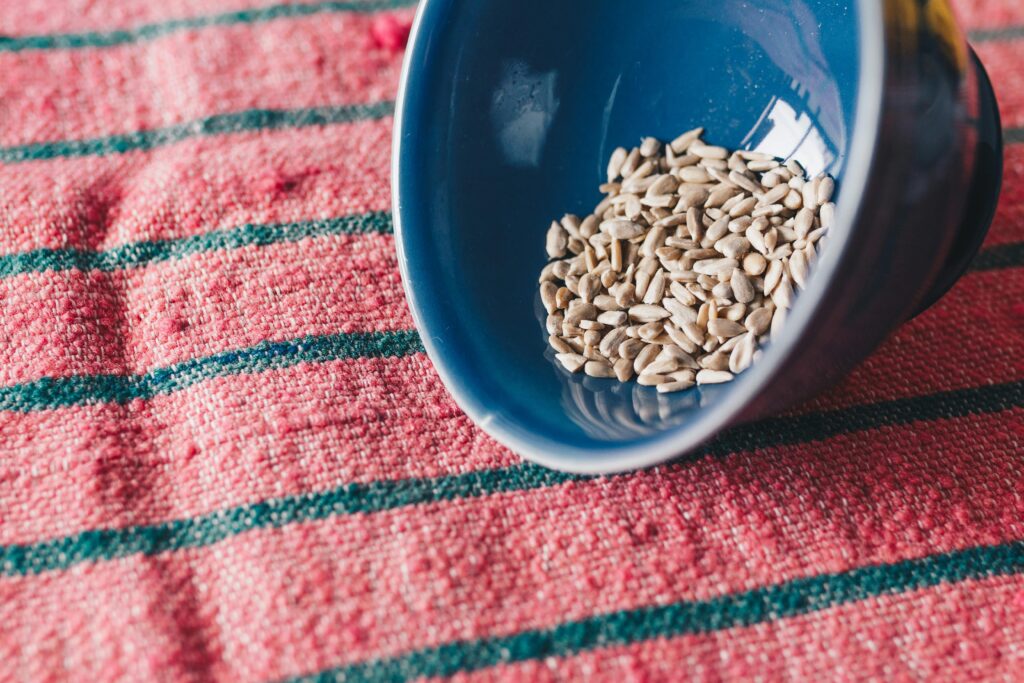
4. Flax Seeds
- Calories per 100g: 534 (70.9% from fat)
Flaxseed is loaded with nutrients. It’s a rare source of polyunsaturated fatty acids. It has lots of fiber and very little sugar involved. Lignans in flaxseeds are capable of fighting cancer. Top off your cheap, high-calorie foods for bulking with these power-packed seeds.
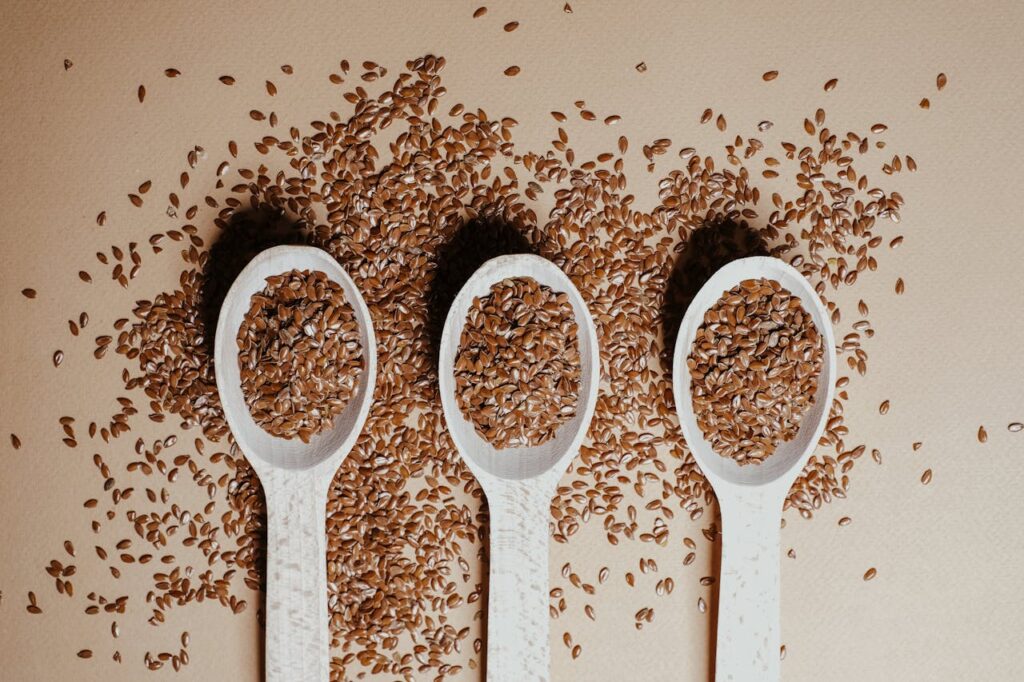
5. Avocado
- Calories per 100g: 160 (82.5% from fat)
A nutritious plus delicious fruit that is almost irresistible. Why resist when avocados can satisfy a big chunk of your Vitamins B, C, E, K daily requirements?
It’s high in healthy fats and fiber. The price of avocados is low in much of the USA since it’s grown domestically in Florida and California.
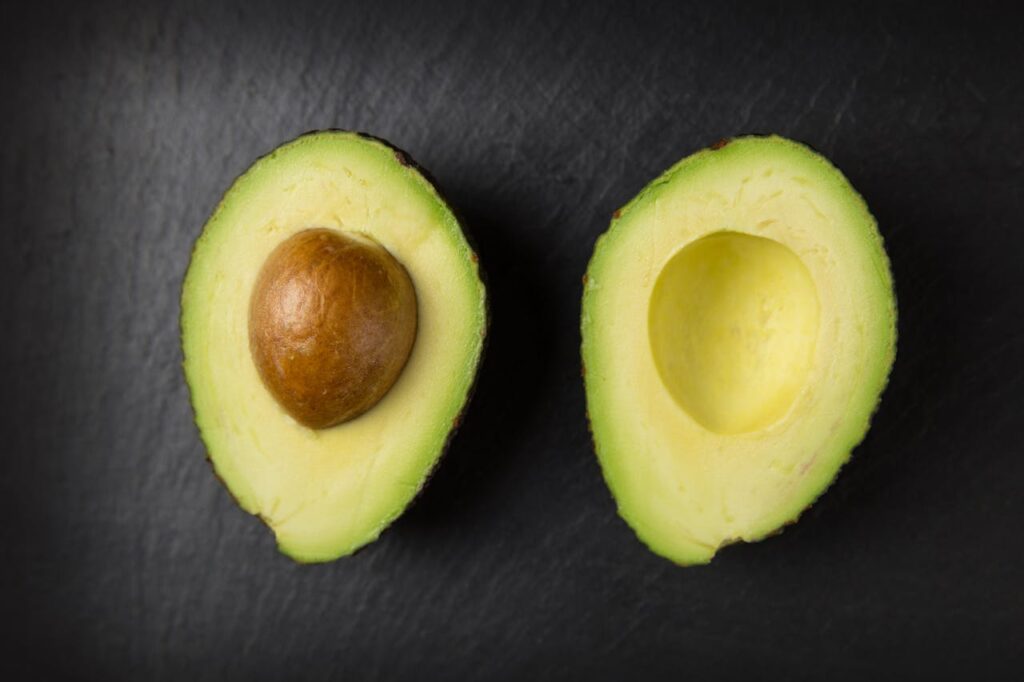
3 Tips for Healthier Eating While Gaining Weight
1. Remember to Make Healthier Choices
The first thing you need to achieve a goal is intent. Whenever you’re crafting your diet plan, ensure it includes healthy meals. Choose high-fiber and starchy carbohydrates as in whole-grain varieties.
Eat wholewheat pasta, unrefined brown rice, and potatoes with their skins on. Cut down on free sugars and salt. Reserve some of your daily protein and fat for oily fish. Salmon, trout, and herring are a few examples. Not so cheap, but they bring heart-healthy omega-3 (EPA and DHA) fatty acids.
2. Eat a Varied and Balanced Diet as Much as Possible
Whether you’re striving to shed or gain extra pounds, your diet should have some diversity.
A balanced diet doesn’t have to be pricey though. It should include fruits and vegetables, lean meats, whole grains and healthy fats. You can hop on the ‘5 a Day campaign’, which means including at least five portions (total ~400g) of various fruits and vegetables daily.
Research supports its effectiveness for a long and prosperous life. See the article for more information about the five major food groups.
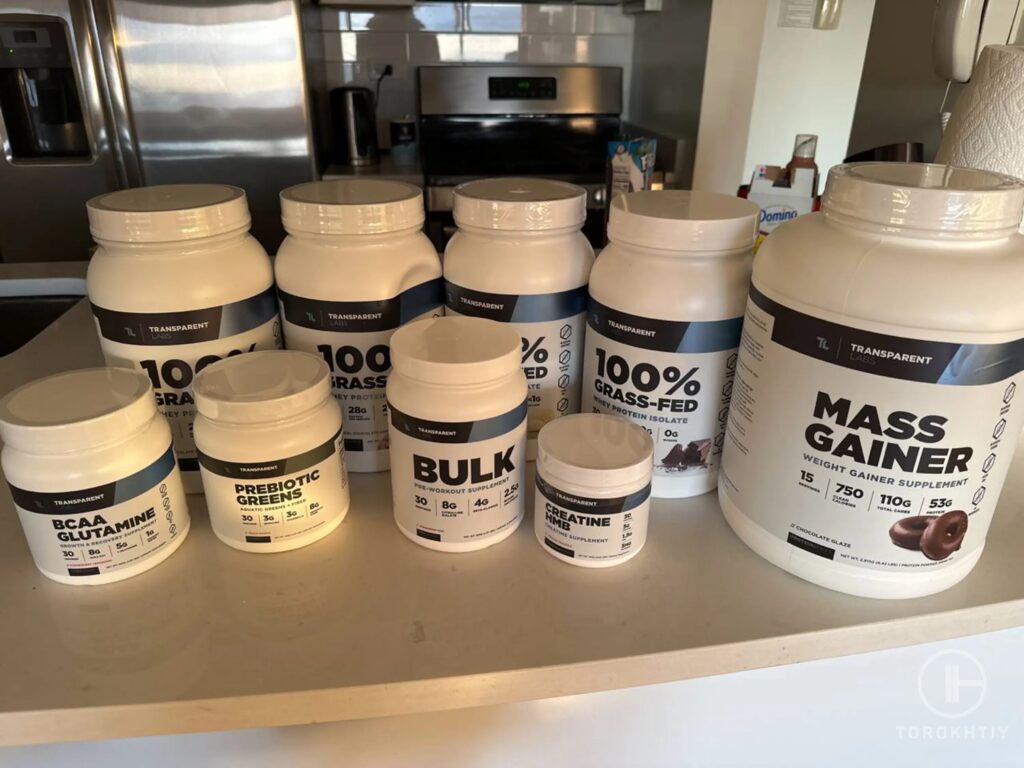
3. Combine Foods With the Highest Calorie Density
Weight management is simple, based on CICO (calories in/calories out). Create a calorie deficit to lose weight and a surplus to bulk up. In any case, avoid starving or stuffing yourself to the gills if possible. Try to make every calorie count with nutritious bites.
You obviously need more calories to gain weight. Therefore, you’ll have to control that hunger-suppressing effect. Spread your meal frequency throughout the day and make them smaller. Blend multiple ingredients into a tasty midday smoothie.
Add protein powder or weight gainer shakes if needed as liquid is less satiating than solid food. Choose denser calorie foods like dried fruits, nut butter, plant-based fats, etc.
3 Tips for Gaining Lean Muscles
1. Think Lean Muscle Mass, Not Total Body Mass
There are two relevant metrics: Body Mass Index (BMI) and Body Fat Percentage. BMI factors in the overall weight and height of a person. It doesn’t distinguish between macho muscles and fluffy fat. The fat percentage tells you that part.
If you eat junk and cheap high-calorie meals with no physical activity, the numbers will ramp up on the scale – but it’s far from good news!
You’ll be gaining mostly fat, which may lead to obesity if continued over the long term. Center the focus of your weight gain plans onto lean muscle mass instead of total body mass.
| Description | BMI Range |
|---|---|
| Underweight | <18.5 |
| Normal | 18.6-24.9 |
| Overweight | 25.0-29.9 |
| Obesity | 30.0 |
| BMI Calculator by ACE Fitness | |
Note: The table below about body fat percentage is the opinion of ACE Fitness and does not represent an accepted standard.
| Description | Men | Women |
|---|---|---|
| Essential Fat | 2-5% | 10-13% |
| Athletes | 6-13% | 14-20% |
| Fit People | 14-17% | 21-24% |
| Acceptable | 18-24% | 25-31% |
| Obese | >25% | 32% |
| Body Fat percentage Calculator by ACE Fitness | ||
2. Don’t Go Down the Path of Dirty Bulking
Dirty bulking or excessive overfeeding will eventually increase fat mass, no matter what you do. Hence, you should remain patient and committed.
First, figure out your maintenance calories. Then, go up or down by at most 500 kcal/day to gain or lose weight, respectively. When starting out, you should gain no more than 2% of your body weight in a month.
Therefore, a 160-lb man can put on about 3.2 lbs in the first month of gaining. More experienced athletes will experience a slower rate of muscle gain due to diminishing returns as they approach their genetic potential.
3. Do Strength Training With Progressive Overload
Resistance training, often referred to as strength training, is the basis for gaining muscle mass. Unfortunately it is not quite that simple. To keep the muscles growing, you have to apply progressive stimulation otherwise you will plateau.
Progression can be made via more weight, more reps, more sets or a combination of variables. On a weight gain journey, feel free to cut some slack for your cardio routine.
However, 150 minutes of weekly activity is a good idea for health, as recommended by CDC. You can get yourself all pumped up in the weight room. Resistance training promotes lean muscle and strength gains. Increase the load or reps to continue to challenge the target muscle groups gradually.
Moreover, it extends opportunities to down high-calorie shakes before and after workouts.
Protein Powder We Recommend – Transparent Labs Grass-Fed Whey Isolate
Transparent Labs Whey Protein Isolate
- Serving Size: 32.96 grams
- Price Per Serving: ~$1.8
- Protein Percent Of Weight (%): 85%
- Proteins: 28 grams
- Carbohydrates: 1 gram (depends on flavor)
- Fat: 0.5 gram (French Vanilla only)
- Added Sugar: 0 gram
- Calories Per Serving: 120
- Recommended By Athletes: Hafþór Júlíus Björnsson, Terron Beckham, Paul Sklar
Transparent Labs Whey Protein Isolate is a top-rated boost for your diet plan. It’s 100% grass-fed and natural. Not only do such supplements help you hit your daily protein requirement, but they also optimize exercise performance and recovery.
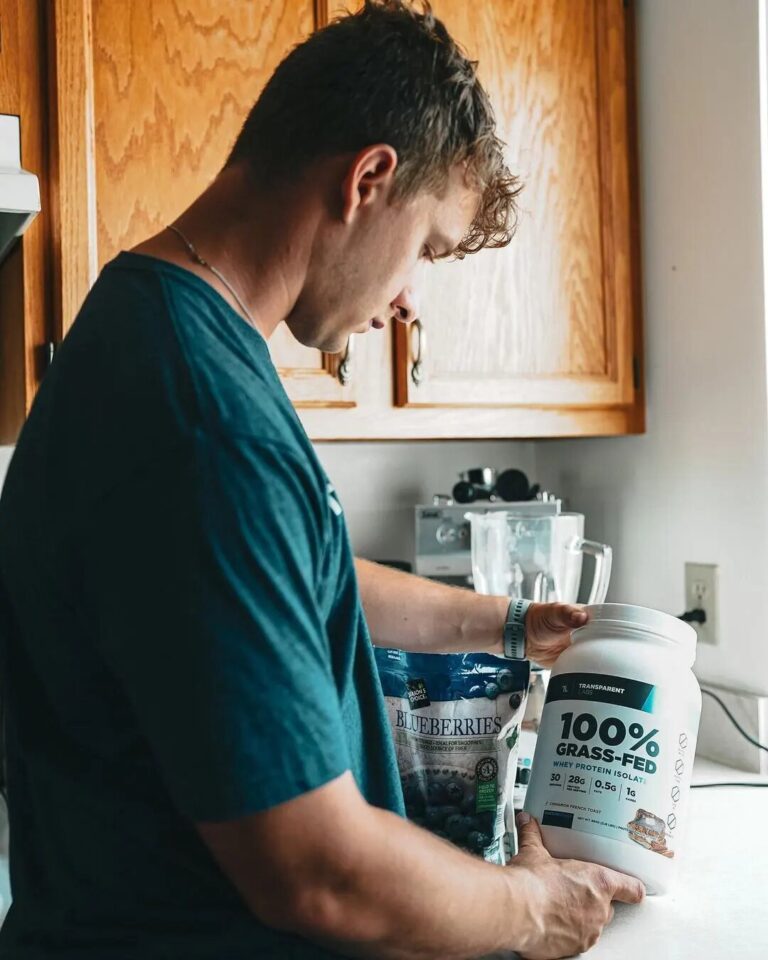
FAQ
What Are Cheap Foods With High Calories?
According to our research, the cheapest calories can be derived from the following foods:
- Dressing: Canola Oil
- Spread: Peanut Butter
- Grain: Oats, Whole-wheat Bread
- Seed: Sunflower
- Animal product: Chicken, Egg
- Dairy product: Greek Yogurt
- Dessert: Dark chocolate
- Fruit: Banana, Avocado
- Vegetable: Sweet Potato
Who Can Eat 3000 Calories a Day?
Daily calorie needs are on average 1600-2400 kcal for women and 2000-3000 kcal for men. Apart from hyperactive individuals or athletes, people planning to gain weight should target the upper range to start and increase as needed.
What Foods Add Up to 200 Calories?
There are nearly infinite ways to customize your plate with different foods to get the desired calorie count. For example, you could get 200 calories in the following ways: 385g apple, 51g cheddar cheese, or 150g eggs. Browse through the USDA Database to figure out nutrition facts.
Conclusion
There are no qualms about eating cheap, high-calorie foods as long as you make healthy choices. If you look, you can find foods that cost little, taste great, and provide many nutrients.
We’ve listed a few of them. Do you have something else in mind? Make sure to drop your suggestions in the comment section.
Also read:
- Best Weight Gain Supplements for Teenage Athletes
- Weight Gain Smoothies
- Best Cereal for Bulking
- Are Potatoes Good for Bulking
- Bulk Protein Shake
- How to Gain Fat in Butt
References:
- Ji Young Kim et al., “Implication of high-body-fat percentage on cardiometabolic risk in middle-aged, healthy, normal-weight adults,” Obesity, Volume 21, Issue 8 p. 1571-1577
- T. Nakamura, S. Kuranuki, “Nutrition—Macronutrients,” Encyclopedia of Cardiovascular Research and Medicine, 2018, Pages 531-537
- Hoang V T Ho et al., “The effect of oat β-glucan on LDL-cholesterol, non-HDL-cholesterol and apoB for CVD risk reduction: a systematic review and meta-analysis of randomized-controlled trials,” Br J Nutr. 2016 Oct;116(8):1369-1382
- Qingtao Hou et al., “The Metabolic Effects of Oats Intake in Patients with Type 2 Diabetes: A Systematic Review and Meta-Analysis,” Nutrients. 2015 Dec; 7(12): 10369–10387
- Julio Mercader, “Mozambican grass seed consumption during the Middle Stone Age,” Science. 2009 Dec 18;326(5960):1680-3
- Syed Saqib Ali et al., “Understanding oxidants and antioxidants: Classical team with new players,” J Food Biochem. 2020 Mar;44(3):e13145.
- Huijun Gao et al., “Analysis of resistant starch degradation in postharvest ripening of two banana cultivars: Focus on starch structure and amylases,” Postharvest Biology and Technology, Volume 119, September 2016, Pages 1-8
- John W. Carbone and Stefan M. Pasiakos, “Dietary Protein and Muscle Mass: Translating Science to Application and Health Benefit,” Nutrients. 2019 May; 11(5): 1136
- Shuangshuang Guo et al., “A review of phytochemistry, metabolite changes, and medicinal uses of the common sunflower seed and sprouts (Helianthus annuus L.),” Chem Cent J. 2017; 11: 95
- Matthew H Sharp et al., “The Effects of Beef, Chicken, or Whey Protein After Workout on Body Composition and Muscle Performance,” J Strength Cond Res. 2018 Aug;32(8):2233-2242.
- Photo by Mart Production, Pexels; photo by Ash, Pexels; photo by Polina Tankilevitch, Pexels; photo by Valeria Boltneva, Pexels; photo by Vanessa Loring, Pexels; photo by Ubert, Pixabay; photo by Tim Douglas, Pexels; photo by Sarah Chai, Pexels; photo by Any Lane, Pexels; photo by Karolina Grabowska, Pexels; photo by Pixabay, Pexels; photo by João Jesus, Pexels; photo by Vie Studio, Pexels; photo by Foodie Factor, Pexels; photos by Torokhtiy Media Team.
Why Trust Us?
With over 20 years in Olympic weightlifting, strength training, nutrition coaching, and general fitness our team does its best to provide the audience with ultimate support and meet the needs and requirements of advanced athletes and professional lifters, as well as people who strive to open new opportunities and develop their physical capabilities with us.
By trusting the recommendations of our certified experts in coaching, nutrition, and sports training programming, as well as scientific consultants, and physiotherapists, we provide you with thorough, well-considered, and scientifically proven content. All the information given in the articles concerning workout programming, separate exercises, and athletic performance, in general, is based on verified data.
The product testing process is described in more detail here.
Author: David Sasha Schulz
Doctor of Chiropractic, BSc Human Biology, CSCS
Strength coach (CSCS) – 10 years
Sasha is a Chiropractor and Kinesiologist practicing in Kelowna, BC, Canada. He has been practicing Chiropractic since 2019, integrating manual therapy, strength training and programming principles, and nutritional strategies to get his patients optimal results. He currently scratches the competitive itch in fitness, and the occasional endurance race, and plays golf and snowboards for fun. He has an interest in all strength and fitness-related sports.



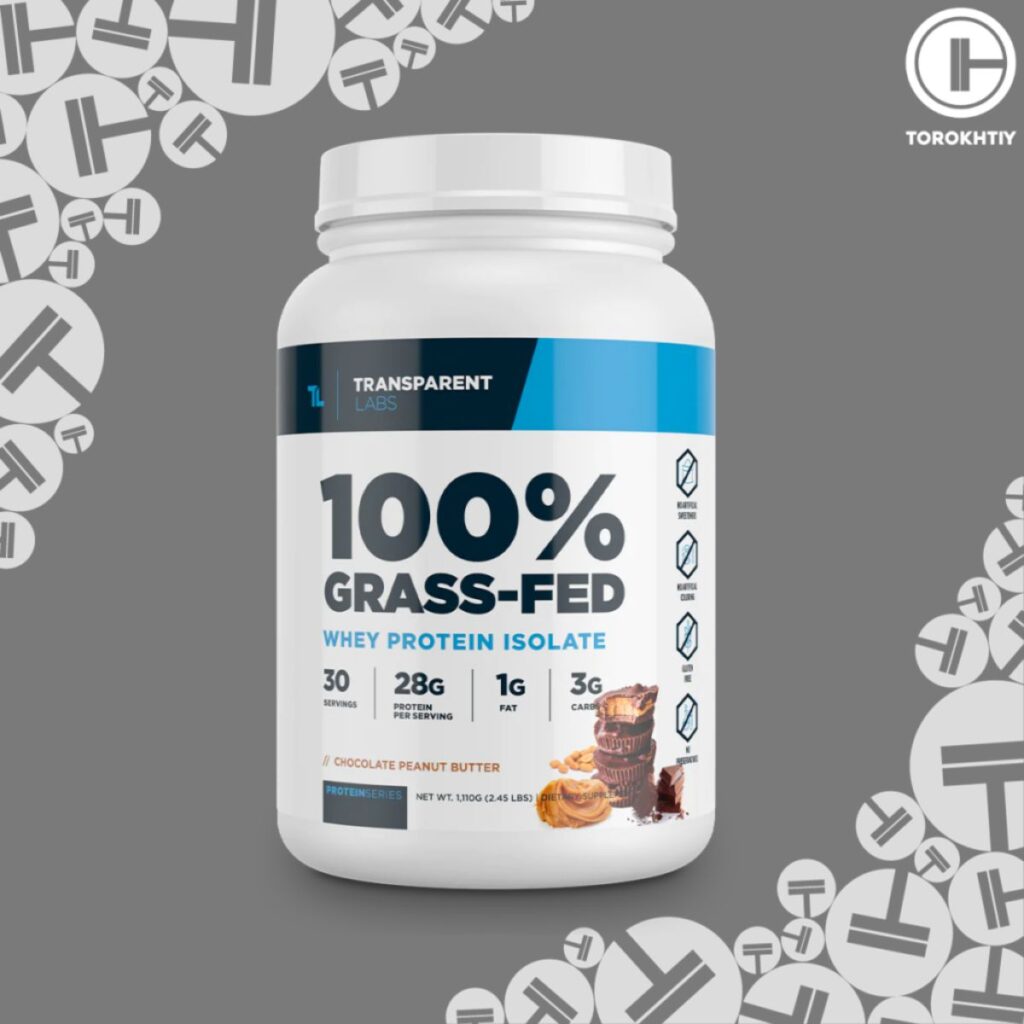
Still have questions after reading our article? Unlock your full potential by engaging with our experts and community! Don’t hesitate — leave a comment below and David Sasha Schulz will provide a personalized answer and insights to help you reach your goals.